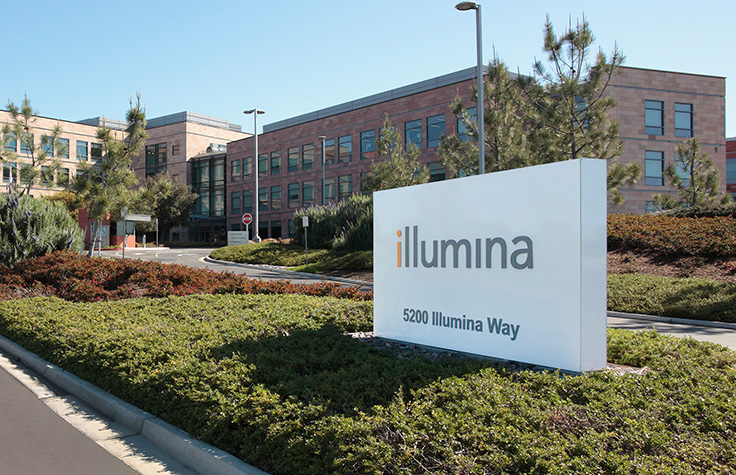
In announcing Jacob Thaysen, PhD, as its new CEO on Tuesday, Illumina (ILMN) trumpeted his “extensive background and experience” in genomics, life sciences, and technology after more than a decade at Agilent Technologies and five years before that at Dako, the Danish cancer diagnostics developer which Agilent acquired in 2012.
Thaysen will become Illumina’s CEO on September 25 after five years as Agilent’s senior vice president and president of its largest division, the Life Sciences and Applied Markets Group, which oversees Agilent’s market-leading analytical instrument portfolio, informatics, and cell analysis franchise. Last year, that division enjoyed revenue of approximately $4 billion, more than 50,000 customers, and an operating margin of approximately 30%.
But Thaysen’s background has not included any service as a CEO, at Agilent, Dako, or elsewhere. That lack of corner-office experience appears to explain why investors have responded coolly to Thaysen’s elevation to chief executive at Illumina.
Illumina shares fell 5% the day Thaysen’s appointment as CEO was announced, from $168.46 to $159.43. After a flat Wednesday, shares stayed flat, dipping another roughly 1% on Thursday, to $158.99 in early afternoon trading as of 2:56 p.m.
The new CEO selection brings further turbulence to what has been an unusually turbulent year at Illumina. The longtime next-generation sequencing (NGS) giant has reeled in recent months from:
- The proxy campaign of activist investor Carl C. Icahn
- Continuing U.S. and European antitrust-based opposition to Illumina’s $7.1 billion purchase of cancer blood test developer Grail, now the subject of a U.S. Securities and Exchange Commission (SEC) investigation, and
- Quarterly results that continued to disappoint investors in the second quarter, prompting Illumina to cut back its growth forecast guidance for this year.
During his proxy campaign, Icahn nominated to Illumina’s board three allies—one of whom, Andrew J. Teno, was elected in May after Icahn stated his case for dropping the Grail acquisition and making other changes in letters to shareholders and an exclusive GEN interview. The election of Teno, a portfolio manager at Icahn’s investment management firm Icahn Capital since 2020, led to the ouster from the board of John W. Thompson, a deSouza ally who had served on Illumina’s board since 2017, the last two years as chairman. deSouza resigned some two weeks later.
In a post today on X, formerly Twitter, Icahn disclosed that he had already spoken to Thaysen, and gave his increasingly important endorsement to the new CEO: “I think he will do an excellent job and he has my full support.”
Elephant in the room
However, a former Illumina senior executive who has extensively discussed Thaysen’s challenges in his new role offered another take—including an explanation for the stock falloff.
“The elephant in the room is that he’s a first-time public CEO, and in fact doesn’t even appear to have sat on a public company board. This is a big risk for a number of reasons,” Alex Dickinson, executive chair of Synthetica Bio, developer of a generative-AI data analytics platform for biopharmas, wrote on LinkedIn this week.
Dickinson was a senior VP with Illumina from 2010 to 2017, during which he founded and led BaseSpace, Illumina’s AWS-based informatics platform, and later led Illumina’s global population sequencing (PopSeq) business.
In his initial post on the Thaysen appointment, Thaysen laid out three reasons why the move was risky. First, as CEO, Thaysen will be expected to ensure Illumina’s fiscal health.
“Without CEO/board experience, how much can investors rely on the quality of Thaysen’s Illumina due diligence? How accurately can he weigh the risks of the SEC investigation? How well can he assess the complexities of a multinational antitrust dispute? The challenges of unwinding Grail?” Dickinson asked.
He said Thaysen will have to rely on information from Illumina’s legal team, “which has every reason to minimize the scale of these problems due to their own involvement in their creation.”
Second, he will be expected to rebuild frayed relations with investors given Illumina’s flat stock performance over the past decade while the Standard and Poor’s (S&P) 500 stock index has risen 200%.
“That in turn relies on deep relationships with Wall Street, and those come from being a prior public CEO or CFO. So I was expecting someone more along the line of Christian Henry or Marc Stapley,” Dickinson wrote. Henry is president and CEO of Pacific Biosciences of California (PacBio), while Stapley is CEO of diagnostics developer Veracyte. “Thaysen simply won’t have existing relationships to build on so he’s going to be pretty much starting from scratch; earning credibility will only come with long-term solid financial performance.”
As a result of the first two risks, Dickinson continued, Illumina will need to rely on its new board chair, Stephen P. MacMillan, who remains chairman, president, and CEO of Hologic.
“Who is really the decider?”
“This is OK in theory, but in practice is going to depend a lot on the Chair-CEO personal relationship, MacMillan’s availability as mentor … and definition of roles and responsibilities. In fact, I would argue that given their respective experience a more ‘natural’—but not feasible—governance structure would be MacMillan as CEO and Thaysen as Pres/COO,” Dickinson elaborated. “There could be organizational tension. Who is really the decider on any particular topic?”
In a second LinkedIn post on Wednesday, Dickinson followed up on Illumina with three steps he recommended Thaysen and Illumina undertake in coming months.
Priority one, Dickinson recommended, is restoring profitability and growth in its core NGS business, where Illumina enjoys “a great brand, 90% market share, and a new platform that’s getting great reviews.”
That new platform is NovaSeq X, the sequencing system Illumina unveiled in September 2022 and has been shipping to customers this year. Illumina said last month that it had enjoyed higher-than-anticipated NovaSeq X shipments, with 109 such instruments shipped in Q2 2023, on top of the 67 shipped in the first quarter. The company said it had raised its supply capacity to more than 390 instruments for this year.
“Solid NGS results will restore ILMN investor confidence and make life very hard for the cash-burning competition,” Dickinson asserted. “Rumor has it that there’s a lot amiss in the ILMN commercial org, suggest start with hiring experienced commercial leadership.”
Step two, Dickinson continued, is ensuring Illumina has the expertise it needs to build or acquire winning technology by seeding internal R&D projects, funding and hiring the best researchers, and investing strategically in the best startups. “This will be a bet-the-company decision just as acquiring Solexa was for NGS.”
Step three, according to Dickinson, is to stem the losses associated with Grail and associated legal costs and what he asserted was a loss of trust among customers, many of them in the NGS space and thus potential competitors.
“Stop the bleeding by divesting Grail (many legal/$ challenges) or flip it into a data asset (“Cancer Bloomberg”) to expand an MCED [multi-cancer early detection] ecosystem full of NGS customers. BTW get new legal counsel,” Dickinson advised.
“Show me” vs. “constructive”
Patrick Donnelly, a director, equity research at Citigroup, also takes a “show me” stance on Thaysen given his lack of CEO experience, reiterating both his firm’s “Sell” rating and 12-month price target of $150 a share.
Yet three other analysts concluded that they have less of an issue with Thaysen’s background.
“Though we were expecting a higher profile CEO, we see Jacob Thaysen’s appointment is constructive with [Illumina] needing someone with operational experience in manufacturing and China,” Puneet Souda, a senior managing director covering life science tools and diagnostics at Leerink Partners, wrote in a research note.
Agreed Vijay Kumar, a senior managing director who heads the Medical Supplies & Devices and Life Science Tools & Diagnostics Team at Evercore ISI: “Illumina’s new CEO comes with a core genomics background, which was critical in our mind given the context of previous hire [deSouza] being outside the industry.”
“Thaysen is a top leader at one of the top five life science companies and is well known by the life sciences and technology investor base, which should help on the communication front,” added Kumar, who reiterated his firm’s “Outperform” rating and $240 price target.
Conor McNamara, CFA, equity research analyst at RBC Capital Markets, wrote in another research note that Thaysen “appears to be a good fit for the company given his experience in the Life Science Tools space.” McNamara retained both his firm’s “Outperform” rating and 12-month price target of $318 on Illumina’s stock, which remains one of RBC Capital’s “three best ideas” for life-sci tools investment.


